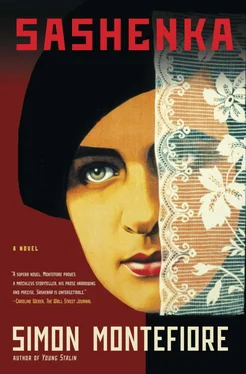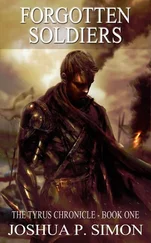During the warm night, she was woken by Lala, who was sitting up in bed. “She was arrested at the school gates, Baron. Yes, the gendarmes arrested her…What shall we do today, Sashenka? Shall we go skating, darling? No, if you’re a good girl, we’ll buy a tin of Huntley & Palmers biscuits at the English Shop on Nevsky. Pantameilion, bring round the sleigh…”
Katinka approached the bed. Lala’s eyes were open and she was holding a photograph to her breast: it was Sashenka in the white pinafore of the Smolny Institute, with the same amused eyes.
“Go back to sleep, Lala. Go back to sleep,” Katinka hushed her, stroking her forehead.
“Is that you, Sashenka? Oh, my darling, I knew you’d come back. I’m so happy to see you…” Lala’s head sank back onto her pillow. Katinka thought her sleeping face was ageless, the tender heart-shaped face of the girl who had come from England all those years ago.
Then she returned to her chair and sobbed—she wasn’t quite sure why—until she fell asleep again.
It was a balmy morning in the Georgian spring. When Katinka woke, the curtains were open. Lala, wearing a frayed pink dressing gown, was holding a small cup of Turkish coffee and a flat loaf of lavashi bread, delivered by Nugzar the warrior from downstairs.
Outside the window, Georgian men were singing “Suliko” on their way to work. There was so much music in Tbilisi. That very Georgian tkemali smell of almonds and apple blossom rose from the garden, the zest of fresh coffee, and the clatter of kitchens, came from the café beneath them.
“Good morning, dear child,” said Lala. “Run downstairs and get some coffee.”
Katinka sat right up. She rubbed her eyes. She had to get back to the hotel and call Roza. Her job was almost done, yet there was still so much to find out. Was Carlo still alive? And she was burning to know what had happened to Sashenka and Vanya. As if reading her mind, Lala said, “I know in my heart that Sashenka’s alive—and I know someone who might help us find her.”
By 10:00 a.m. next day, Katinka was back in Moscow and walking up Tverskaya Street. As a student, she had browsed at the World of Books shop on Tverskaya. Now she rang the bell on the third door of the building. The door clicked open into a naked stone hall with the usual stench of cabbage and she rode up to the penthouse in a tiny, dyspeptic elevator that reminded her of a sardine tin hanging on a cable. But when the doors groaned open, she gasped in surprise. Instead of a landing with three or four doors, the elevator opened into a high-ceilinged apartment decorated in gracious, airy pine, filled with the sort of dark, noble furniture she usually saw in museums. The walls were stacked high with books and thick magazines of the Soviet era, and hung with paintings in gold frames and old movie posters. It was not overpoweringly grand like Marshal Satinov’s place but cozy and aristocratic, the apartment of a well-off aesthete of Tsarist times.
“Welcome, Katinka,” said a striking elderly woman standing in the middle of the room. Well dressed, with a busty figure neatly shown off in one of those tweed suits worn by Marlene Dietrich in the forties and a hairstyle to match, she suited the room so well she might have been posed there by a fashion photographer. Katinka guessed she was well over eighty, yet with her strong eyebrows and thick hair dyed black she held herself like an actress on her very last tour.
“I’m Mouche Zeitlin,” the woman said, holding out her hand. “Come on in and I’ll show you round. This was my father’s study…” She led Katinka into a small room still heaped with papers and books, pointing out a wall of volumes. “These are all his works. You probably remember some of them—or maybe you’re too young…”
“No, I knew his name,” answered Katinka. “In my father’s bookcase we have all the Gideon Zeitlin books along with Gorky, Ehrenburg and Sholokhov…”
“A giant of the Soviet era,” said Mouche, who spoke the noble Russian of a trained actress. “Here!” She pointed at the large black and white photographs on the wall that showed a beaming black-eyed man with a grey-black beard and the same eyes and smile as his daughter. “That’s my father with Picasso and Ehrenburg in Paris, and that’s him with Marshal Zhukov at Hitler’s Chancellery in 1945. Oh, and that’s him with one of his many girlfriends. I used to call him Papa momzer —that’s Yiddish for ‘Daddy the rogue.’ As for us, my sister and mother died in the Siege of Leningrad but my father and I, with our sense of humor, survived wars, revolutions and terror. In fact, we flourished—I’m a little ashamed to say. See those posters? That’s me in my films. You’ve probably seen a few. Let’s have tea.” They crossed the impressive hall and Katinka found herself sitting at a big kitchen table. “Are you writing about my father or me?”
“No, actually, that’s not why I came see you…” Katinka blushed but Mouche Zeitlin waved it away.
“Of course not, why should you, dear? You’re the new generation. But you said you were a historian.” She lit up a Gauloise, which she smoked in a silver holder, offering a cigarette to Katinka.
“No, thanks,” said Katinka. Then she told Mouche about meeting Roza and Pasha, and the story up to the previous day with Lala. “Lala sent me to you. She had your address; I think she must have kept it when Samuil died. And now we know that my client Roza Getman is Snowy, Sashenka’s daughter.”
“God! Snowy!” Mouche lost her brashness and suddenly she dissolved in tears. “I can’t believe it! How we longed to find that child. And what about Carlo?”
“I hope we can find him somehow.”
“But Snowy’s alive and well? I can’t believe it!” Mouche held out her arms to Katinka as if the visitor herself were long-lost family. “You’re a messenger bringing us blessings! Can I phone her? When can I meet her?”
“I hope very soon,” replied Katinka. “But there’s still so much to discover. I came to tell you this good news but also to ask you—did you ever look for Sashenka and Vanya?”
“Right up until his death, my father tried to find out what had happened to them and the children. There were many times during Stalin’s reign when my father was close to destruction himself, even though he was one of the dictator’s pet writers. At the end of the war, my father traveled down to Tbilisi to meet up again with his elder brother Samuil—and Lala Lewis, of course. They were very happy together. It was such a joyous reunion, the two brothers hadn’t seen each other for so many years. Anyway, Samuil made my father promise that as soon as he could, he would find out about Sashenka and her family.”
“Did you find anything?” asked Katinka, taking out her notebook.
“Oh yes. Even during Stalin’s lifetime, Papa inquired of the Cheka and was told that Sashenka and Vanya had received ten years in the camps in 1939. We applied again in 1949, when Sashenka was due to be released, but were told that she had received another ten years without rights of correspondence. During the Thaw after Stalin’s death, we were told that they had both died of heart attacks in the camps during the war.”
“So there’s really no hope for her.”
“We thought not,” said Mouche. “But in 1956 a female ex-prisoner, a newly released Zek, called on us here and told us that she’d been with Sashenka in the Kolyma camps, that she’d last seen Sashenka very recently, and she was alive when Stalin died in March 1953.”
Katinka’s heart leaped.
Later that day, a black armored Mercedes collected Katinka from the Moskva Hotel and drove her to Pasha Getman’s headquarters, a former prince’s mansion off Ostazhenka Street. Katinka was curious to see “The Palace,” as it was known in the press. It was said to be a hive of political and financial intrigue so she was almost disappointed when they drove through the security gates and stopped in front of a graceful but small two-story residence in white marble with curling oriental-style pilasters. Inside, the hall was decorated, decided Katinka, like a Turkish sultan’s harem, with many divans and fountains. She was met by a beautiful black-haired secretary, a Russian girl not much older than she, in a little black suit with a tiny skirt and colossal high heels, all set off by a clinking gold belt. Katinka knew at once, just from the girl’s proprietorial slink, that this “Versace girl” was not exclusively Pasha’s typist.
Читать дальше












